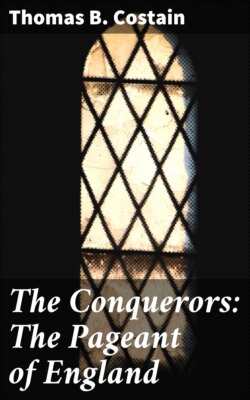Читать книгу The Conquerors: The Pageant of England - Thomas B. Costain - Страница 22
На сайте Литреса книга снята с продажи.
4
ОглавлениеTable of Contents
The Norman kings were fiercely addicted to the chase, and one of the first acts of William the Conqueror had been to seize all of the forest land in Hampshire known as the Jettenwald, or Giant’s Wood, and turn it into a royal preserve. Some of the early chronicles say that he drove the people out of fifty-two villages and tore down twenty-two churches to obtain what he wanted in the way of private hunting grounds, but this obviously is an exaggeration. He did, however, appropriate nearly one hundred thousand acres between the Solent and the Avon and he fixed the most rigid restrictions. It became known as the New Forest.
The people resented the preserve laws so bitterly that a superstition grew in their minds about the New Forest. They believed it would prove unlucky for the Norman breed. The first evidence in support of this belief was the death there of William’s young son Richard, who was gored by a stag.
On the second day of August in the year 1100 William Rufus and a party from the court were at Brockenhurst in the New Forest. Henry, his brother, was one of the party, the rest being William’s special cronies and, no doubt, a rude and dissolute lot. The King’s sleep had been broken the night before by dreams of death, his own death, and in the morning word reached him from an Abbot Serlo in Normandy that one of his monks had been troubled by similar dreams and had reported them so that the King might have due warning. At first the Red King had doubts about going on with his plans for the day. It was a warm day, however, and perfect for hunting. Whenever William was in the woods he expanded with pride. The forests were his and every living thing therein. He was so pre-emptive of the privileges of the chase that it could easily be believed he said to himself, Every tree in England is mine, every stream and glade, every deer and bear and fox and rabbit is mine, mine, mine!
He spent the morning over state papers, which had to be read to him because he had never gone to the trouble of learning his letters. After a heavy dinner in the middle of the day he made up his mind. “Do they take me for an Englishman,” he muttered, “that I pay heed to their dreams and go out of my way when an old woman sneezes?”
He called for six of the special arrows he always used. Three he gave to his usual hunting companion, Walter Tyrrell, lord of Poix. “Take them, Wat,” he said. “A good marksman should have good arrows.”
The party divided up. Prince Henry proceeded in one direction. The others made up groups of threes and fours. The King and Walter Tyrrell went off alone, plunging deep into the woods which, to anyone who believed in the curse, might have seemed to beckon. William Rufus was never seen alive again.
His body was found later in the afternoon in a glade near Stoney Cross Knoll, stretched out at full length, an arrow in his heart. The ruddy tone had left his cheeks, his eyes were fixed. He had been dead for some hours.
Walter Tyrrell was not to be found. Whether or not he was responsible in any way for the violent death of the violent King, he knew that he would be blamed. To be blamed for the death of a king might mean being kept for life in one of those deep dungeons, or the loss of one’s eyes through the application of iron bars heated white, or the tightening of a hempen rope around the neck. The lord of Poix wanted none of this. It was learned later that he had turned and ridden at breakneck speed for the coast. He reached France and went off crusading; and, wise man that he was, never came back to England.
The manner of the Red King’s death remained a complete mystery. Someone with a grievance may have shot the fatal arrow from behind a tree as William and his solitary companion rode by. It may have been an accident, and this seems the likeliest explanation. But the people of England had no doubts about it whatever. The curse was still working, and it had brought another of the royal line to his death.
The men who discovered the body seemed as anxious to get away as Wat Tyrrell had been. They scattered in all directions, and the remains of the King lay untended until nightfall, when a charcoal burner named Purkis came along. In a matter-of-fact way he dumped the body in his cart and carried it to Winchester. Here it was taken to the minster of St. Swithin and it was buried in a black stone coffin under the central tower. No bells were rung, no masses said. The man who had thought he owned all England and all Englishmen was deposited in consecrated ground, but it was a hurried and apprehensive laying away, as though they feared that evil still lingered about the inanimate clay.
Several years after the burial the tower collapsed and a mass of broken masonry and rubble covered the bones of the dead King. This, needless to state, was accepted almost universally as a Sign.
